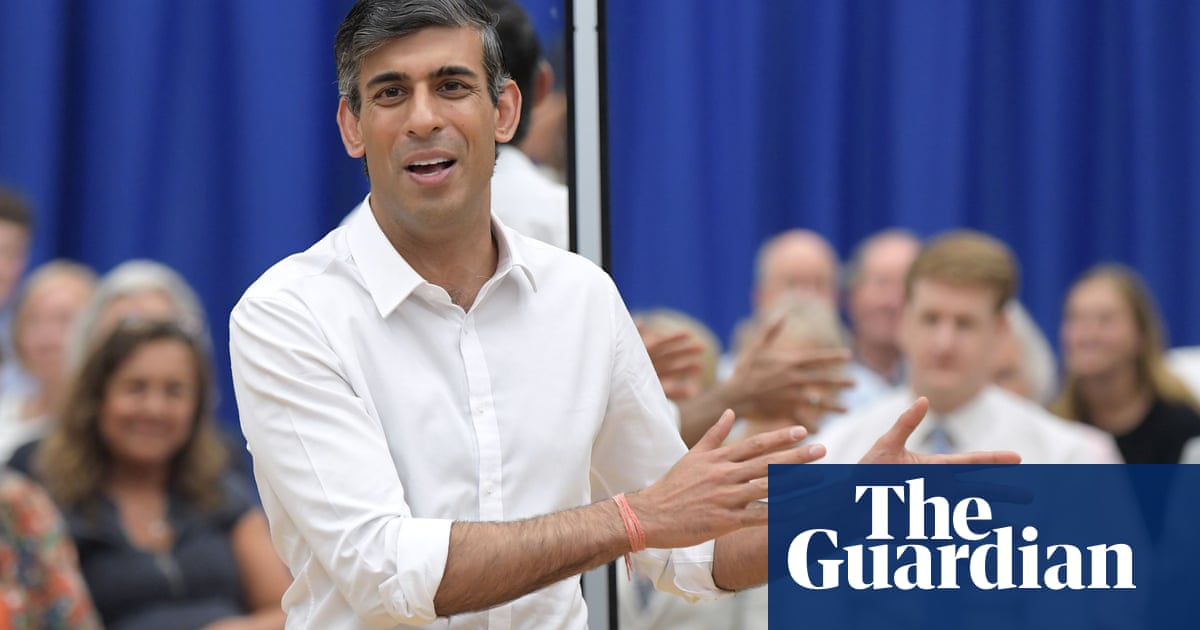
Show caption Rishi Sunak’s parents came to the UK as children from east Africa in the 1960s. Photograph: Anthony Harvey/Rex/Shutterstock Rishi Sunak Would Rishi Sunak put the brakes on culture wars as a minority ethnic PM? Analysis: Some see him as a typical Tory, but community groups say his ascent to No 10 would be a British milestone Aina J Khan Community affairs correspondent Sat 23 Jul 2022 07.00 BST Share on Facebook
Share on Twitter
Share via Email
If Rishi Sunak wins an uphill battle against Liz Truss in the weeks to come, he will join the small number of black, Asian or minority ethnic (BAME) leaders of majority-white countries in the west. They include Barack Obama in the US, Portugal’s prime minister, António Costa, who is partly of Goan descent, and Leo Varadkar, the former Irish prime minister whose father is Indian.
When Sadiq Khan became the first Muslim leader of any western capital city, it made headlines around the world. The ascent of Sunak, the son of Hindu Indian emigrants, would be an equal “milestone moment” reflecting Britain’s diversity, community groups have said.
But Sunak has been urged to use his position to “put a brake” on culture wars sowing division across Britain along race and gender lines. Experts also said Britain’s relationship with India – where the Hindu nationalist BJP party of the prime minister, Narendra Modi, has been accused of persecuting Muslims – would be even more carefully watched under a new British-Indian leader.
Simon Woolley, who stepped down last year as the chief executive of Operation Black Vote, which was set up to address the BAME democratic deficit, said Sunak becoming prime minister would be “profoundly significant”. “I think it would give a lot of hope to many young people from that heritage, that we can aim for the highest office,” he said.
But Woolley called on Sunak, who spoke in 2020 about suffering racist abuse, which “stings in a way that very few other things have”, to go further by acknowledging and acting on structural racism.
Whoever the next prime minister is, Woolley said he hoped they would put a “hard brake on faux culture wars that shamefully seek to win votes that divide poor black people against poor white people”.
“Many would like to see a black or brown prime minister that strongly advocates for tackling systemic racism, systemic race inequality, and I don’t think we’re going to get that,” Woolley said.
Sunak’s parents came to the UK as children from east Africa in the 1960s at a time many Indian families were expelled or encouraged to leave by the newly independent Uganda, Kenya and Tanzania.
This group of people, which included the shopkeeper father of the home secretary, Priti Patel, was actively courted by the Conservative party as potential voters. Margaret Thatcher applauded their “splendid qualities of enterprise and initiative” at a Diwali banquet in 1981, according to Neha Shah, a researcher at Oxford University.
Sunak would represent a major first but he was also a “typical Tory”, said Shah. “It’s very helpful for him and his team to focus on this idea that he’s breaking the mould in some way by becoming the first Indian [UK] prime minister. But actually if you look at his background, if you look at his class, especially around the wealth he has, he’s actually a very typical Tory prime minister.”
Sunak went to Winchester college, the public boarding school that now costs more than £40,000 a year to attend. He went on to study politics, philosophy and economics at Oxford University, as did Truss. Footage has emerged of the former chancellor saying, in his early 20s, that he had “no working-class friends”.
It was as a Fulbright scholar at Stanford University that he met his wife, Akshata Murty, whose multimillion-pound portfolio has made her richer than the Queen. If elected, Sunak would probably be the richest prime minister in modern times, said Shah.
In 2019, Boris Johnson’s cabinet was heralded as a “cabinet for modern Britain” for its appointment of Patel, Sajid Javid, James Cleverly and Alok Sharma. A year later, when Sunak succeeded Javid as chancellor, there were celebratory cries of the “most Indian cabinet” in British history.
If Sunak made it to prime minister, how would this affect his party’s appeal to British Indians, who make up 2.5% of the UK population?
“It is another milestone moment,” said Nayaz Qazi, the director of Conservative Friends of India. “Rishi Sunak could be the first British Indian-origin prime minister, or [if Truss wins] we could have our third woman prime minister.”
While the political allegiance of British Indians has varied along class, generational and religious lines, British Indians overall have long been core Labour voters. But anecdotal evidence suggests support has dropped among some Hindu voters over the years.
In an LBC interview on Thursday, Sunak stressed his family’s relatively humble background and described himself as a practising Hindu, saying he had recently returned to the temple his family still attends in Southampton.
Sunak’s father-in-law, the billionaire entrepreneur and co-founder of the technology giant Infosys NR Narayana Murthy, has spoken in support of Modi in recent years, according to Priyamvada Gopal, a professor of postcolonial studies at Cambridge University. In 2018, before Modi won a second term in power, Murthy said: “Broadly, I personally feel the prime minister has led a strong, economical, progress-minded government.”
Britain’s next prime minister could come under pressure to condemn Hindu nationalism in Modi’s India. “[Sunak] won’t, and he can’t because of Britain’s continuing economic interests in India,” said Gopal.








